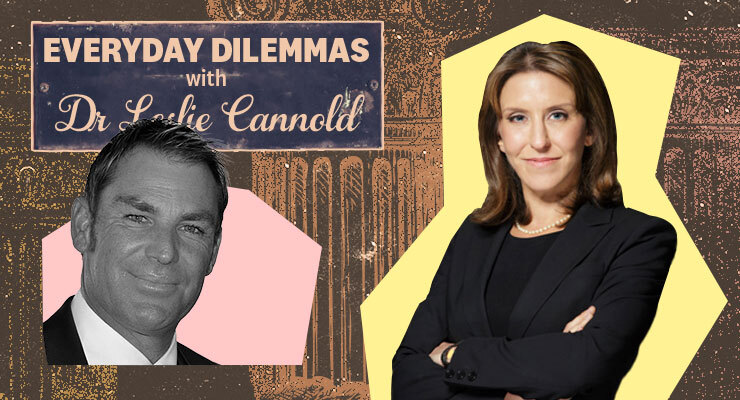
Dear Leslie,
I’ve been watching the discussion about Shane Warne unfold on Twitter and both sides are so far apart. I was wondering what you think. Are we obligated not to speak ill of the dead or does that kind of silence paper over unsavoury truths that should be acknowledged?
Lurking in the Shadows
Dear Lurking,
Great question.
I think timing is key. It’s easy to forget that public figures are just like us: people with families who need time to get over the shock of a death, particularly when it’s sudden. Unless there’s very good reason, no one should speak ill of the dead before the body is in the ground. Ditto discussions about the deceased’s suitability for a state funeral.
Why? Because in those first early days, the last thing intimates need to hear is negative things said about their loved one. Even things they know to be true and that the deceased didn’t deny.
This was the case with Warne. A unique and extraordinary athlete but also a man with flaws he was aware of and owned.
Personally, I’d watch my step up to a year or even two after someone passes, which is when grief and loss experts tell us the bereaved may still be on an emotional roller-coaster or just starting to have more good days than bad.
The only exception to this rule is where a failure to mention a terrible truth is to continue the cover-up that the person enjoyed in life at the expense of others. I’m thinking paedophile priests whose crimes were covered up by the church, or child traffickers like Jeffrey Epstein, whose suicide was the final denial to his victims of the accountability he avoided throughout his life.
I appreciate that such prohibitions make it challenging for those offended by the way Australia disproportionally honours sportsmen and politicians to get traction on the issue (something a news cycle reliably provides).
But it still seems to be both possible and important to search for other ways to skin that cat that don’t treat those left behind as collateral damage.
Leslie
Dear Leslie,
I’m a hack from one of your competitors. Better not to say which one because I’m writing to complain about the softly-softly approach being taken about the war in Ukraine. How can any Australian news outlet stay “neutral” about a war of aggression by an authoritarian superpower against their tiny neighbour who was just trying to become a democracy?
Outraged on the Airwaves
Dear Outraged,
You won’t get anything but furious agreement from me. I think we all now recognise that “fair and balanced” only works when it sits beneath an umbrella of agreed facts and shared values. The facts are that Russia has aggressed against Ukraine (and before that Crimea and before that Georgia) in a way that flies in the face of international law and for reasons that go no deeper than its despotic ruler’s seeming desire to reimpose totalitarian control over the former Soviet republics.
Denying these facts is wrong. It’s also wrong to pretend there’s a moral equivalence between governments by and for the people that rule by law and those in which one person holds all the power and rules by force. Not to mention dangerous, particularly in the 21st century, when liberal democracies are under siege.
No, everyone with a megaphone or a spotlight has a responsibility to use it in ways that promote truth and discourage tyranny in their own backyard and around the world.
Good luck in promoting this view in your small corner.
Leslie








” “fair and balanced” only works when it sits beneath an umbrella of agreed facts and shared values. ”
So true!!!
that is a great observation, and i’ll be borrowing that one for future use thanks LC.
Thanks Glenn! You give the best feedback – a columnist’s dream!
I would have thought that it’s when the facts are NOT agreed and the values are NOT shared that there is the greatest need for fair and balanced reporting. Surely it’s in such a situation that the duty of the journalist is to seek to understand the points of view of both sides, and the facts and values on which they’re based, and set them both out fairly and as objectively as possible.
Robin, this is how i interpreted the observation: –
first of all, forgive me my sporting analogy (gaaah)
we both watch a footy match, team A wins, that is our shared reality.
From here, we can talk about if team A deserved to win, if the umpiring was fair etc, we can even discussing whether or not rules need to be changed.
But we don’t deny that team A won, or that the game was in fact ever really played. We need that shared foundation of agreement to start a coherent discussion.
it is this discarding of objective reality, of what actually happened in real life, in order to substantiate a point of view, which is the step-too-far that leads to the undermining of social cohesion.
If the weather reporter says it’s raining, we don’t require an alternative weather reporter to tell us it’s not. And to do so only adds a credibility to the alternative weather reporter that they don’t deserve.
Now i’ve morphed my sports analogy into a weather reporter one, def. time to stop.
Anyway, that’s my take on what Leslie wrote. 🙂
Criticizing the dead is utterly pointless, unless you’re just looking for a boost to your own self-esteem (as in: I’m better than they were, etc). Criticism has only one valid purpose, which is to alert the individual as to how they could become a better person (better in the eyes of the criticizer at least). Dead people can’t benefit from advice, so why do it unless you need to feel smug – as in “haha, they died because of their own foolishness, and I didn’t”. Speaking ill of the dead just speaks ill of the speaker.
De mortuis nihil nisi bonum
known for thousands of years
Dear Leslie. Love your work 🙂 Not so keen on the animal violence metaphor though. Critters are already seen as disposable and an outlet for cruelty by many people. I know you many not be a cat lover, but are there other ways you could describe options?